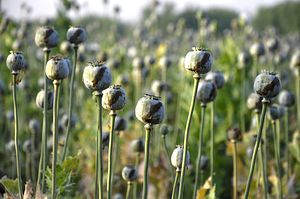Rising poppy cultivation in Myanmar’s Golden Triangle is feeding violence and instability in that country. Recent fighting in the Kokang region and the declaration of martial law is troubling, as is the displacement of communities caused by this violence. The problem for the United States: Few U.S. officials are likely to truly understand how increased cultivation relates to the violence, or the ripples that this trade can cause within the regional security environment. Drug trafficking is an issue that exists beneath the surface of traditional Asia-Pacific security concerns. It is not discussed with the frequency of North Korean missile programs or China’s rise, yet it matters as it is equally likely to upset stability. It will matter when armed groups funded by this trade place a young democracy at risk, presenting a new headache for the United States in Asia. It will matter if the U.S. military deploys troops to confront such instability in Southeast Asia.
Pentagon officials and military leaders are more comfortable focusing on traditional conflict scenarios. War is much easier to comprehend when your enemy is wearing a uniform and battle-lines are clearly defined. Transnational crime, food insecurity, and threats posed by communicable disease are increasingly defining the changing face of security. These challenges must be accounted for when U.S. military leaders in the Pacific think about the region.
The topic of narcotrafficking demonstrates how a non-traditional security issue can dramatically impact prospects for stability in the region. A 2013 report by the United Nations Office on Drugs and Crime highlighted that Southeast Asia produced an estimated 48 tons of heroin in 2011. The vast majority of this cultivation – roughly twice that of Afghanistan, which arguably receives much greater attention – has occurred in the fragile state of Myanmar. The UN report estimated that the revenue generated from this trade to be worth $16.3 billion during the same period. For perspective, an annual report from the International Institution for Strategic Studies estimated that Myanmar’s defense budget for fiscal year 2012 totaled just $2.23 billion. From 2002-2006, Myanmar demonstrated the ability to reduce poppy cultivation. Since then, however, increasing cultivation has been the trend. As Joshua Kurlantzick of the Council on Foreign Relations notes, armed groups are reaping considerable benefits from this increasing illicit trade.
Why should the staggering amount of revenue generated from this trade matter to the American military? The revenues generated from such trafficking often lie at the root of instability and violence in the region. Additionally, the same routes used to smuggle drugs will likely be used to transport weapons and militants in the event that the current conflict expands. Reconciling the numerous armed ethnic groups that exist within Myanmar continues to be a challenge for the nascent government. A strong drug trade will only complicate negotiations between government officials and these groups.
Critics would argue that this is mission-creep for the U.S. military. Transnational crime should be dealt with by local and regional policing. Food security is an issue best addressed by development experts. U.S. military officials could reasonably argue that devoting time to such extraneous concerns detracts from its core mission. These arguments deserve careful consideration. It should be noted that the American military has increasingly found itself confronted with these issues and has had to devise ad-hoc solutions. While the direct involvement of U.S. military officials in these issues may be unlikely and even unnecessary, it does not excuse ignorance of these challenges. Land forces such as the Army or Marine Corps are most likely to be called upon to address these problems. Surveying Asia as recently as last year, the Army’s senior commander in the region General Vincent Brooks highlighted the importance that professional land forces should play in influencing the human domain. Truly understanding this domain requires an understanding of these non-traditional security challenges.
America’s leaders will tell you that the nation is entering its Pacific century. The rebalancing of U.S. strategic interests to the region requires a military that is not only comfortable with traditional conflict scenarios, but also requires a force that understands how contemporary security challenges will influence the course of the region’s stability. Perhaps understanding how transnational crime will impact security in the region will be a start. We’ve got a lot to learn.
Captain Jon P. Cheatwood, U.S. Army, is a graduate student at the Fletcher School, Tufts University where he is pursuing a Master of Arts in Law and Diplomacy (MALD). He holds a B.S. from the United States Military Academy and was most recently assigned to the 25th Infantry Division in the Pacific theater. The views expressed here do not represent those of the United States Army or the Department of Defense.

































